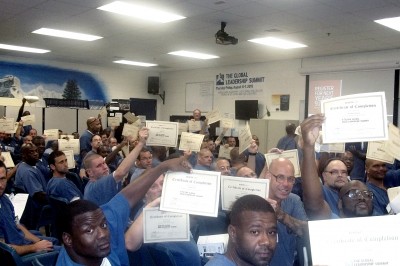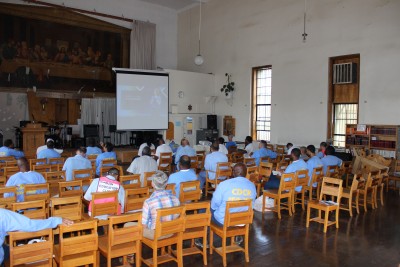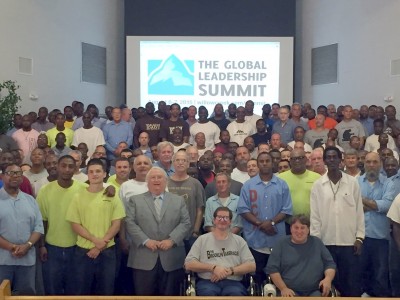
Men at the Graceville Correctional Facility in Graceville, Florida, proudly display their certificates for the completion of the Global Leadership Summit. (Click image to enlarge.)
When someone says “leadership,” what is the first thing that comes to mind? For some, the first image of a leader is a captain of industry—a visionary like Steve Jobs who has changed the world with innovation and an indomitable spirit. Others might think of a military officer who is able to get their troops to go beyond what they could ever do as individuals by working as a unit for a grand and noble cause. Or perhaps the thought is of a teacher—someone who is able not only to instruct, but to instill a passion for learning amongst their students. What you probably didn’t envision were prisoners. Yet, last week, in prisons across the United States, men and women gathered to listen to people like best-selling author Jim Collins, Pixar Animation Studios founder Ed Catmull, and others discuss their visions for leadership and strategies to lead others, as a part of Willow Creek Association’s annual Global Leadership Summit. For the second straight year, Willow Creek worked with Prison Fellowship to simulcast the two-day event in prison. In 2014, four facilities were able to participate. This year, men and women in 11 different prisons from Florida to California took part, learning from thought leaders in business, academia, and churches.

Greystone Chapel, once the subject of a Johnny Cash song, was the site of this year’s Global Leadership Summit at Folsom Prison in California. (Click on image to enlarge.)
While it might seem counter-intuitive to include those behind bars in a conference focused on leaders, the need for such training becomes readily apparent when you look at the fact that roughly 97 percent of prisoners eventually do leave prison to enter the larger community. Preparing these men and women to become leaders upon their release is more than a good idea—it is vital to helping them succeed and avoid returning to prison. In his address to the conference attendees, Bill Hybels, pastor at Willow Creek Church and convener of the event, urged those listening to embrace the “five intangible” qualities of leadership—grit, self-awareness, resourcefulness, self-sacrificing love, and a sense of meaning. These qualities are of particular value to former prisoners, who need the grit to overcome past mistakes, the self-awareness to acknowledge the weaknesses that keep them from moving forward, the resourcefulness to get things done even with the many extra hurdles in front of them, the willingness to sacrifice the self-centered behavior that helped to put them in prison in the first place, and to have a “why” for what they seek to accomplish.

Warden Burl Cain (in suit in front row) and the participants of this year’s Global Leadership Summit at the Louisiana State Penitentiary in Angola. (Click on image to enlarge.)
But leadership is not just limited to those who will be leaving prison. During the Summit, a video was presented focusing on the men at Louisiana State Penitentiary in Angola, and on Warden Burl Cain. Angola is a maximum security prison, and most of its residents will die inside the prison’s walls. When Warden Cain, now a Prison Fellowship board member, took over, the prison had the reputation of being the bloodiest prison in the country. Today, the prison is seen as a model of what a maximum-security prison can be. Incidences of violence are way down, and church steeples inside the prison loom over nearby guard towers. A Baptist seminary now exists inside the facility. Perhaps not surprisingly, Angola has participated in the Global Leadership Summit for the last two years. The prisoners featured in the video are all serving lengthy prison sentences. But that has not stopped them from becoming leaders. Several of the men are serving as pastors in one of the many churches inside the prison, looking to transform the lives of those around them. Prison Fellowship has long recognized the potential for developing leaders in our prisons. Through in-prison Bible studies, a seminary-level program in a number of facilities across the country, and values-based reentry programs in Texas and Minnesota, Prison Fellowship is encouraging a new generation of leaders to serve, both in their prisons and beyond. To find out more about these programs, click here.